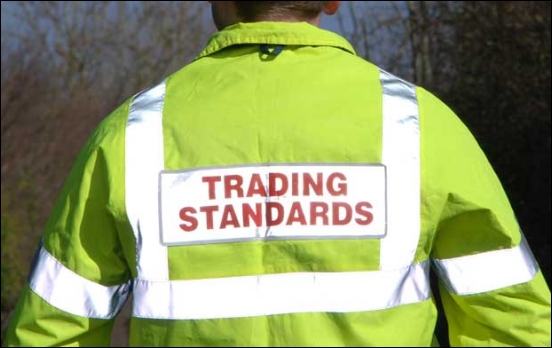Burnham-On-Sea and Highbridge residents of all ages are being urged to become ‘scam aware’ amid a rising number of fraud cases.
Local Trading Standards bosses are raising awareness of scams during Scam Awareness Month, explaining how to spot them and how to report them so others don’t fall for them.
Whether it’s vishing (phone scams), phishing (text message scams) or smishing (email scams), knowing how to spot a scam is the first step to avoiding it.
A scam is a scheme to try to steal money, personal information or data from a person or an organisation. Other names including fraud, hoax, swindle, cheat, or a con.
The National Fraud Intelligence Bureau has found a seven per cent increase in the number of offences in England and Wales compared to last year which is more than 660,000 reports made to the bureau – and experts estimate that only 5-15 per cent of all scams are reported.
 Councillor David Hall, Somerset County Council’s Cabinet Member for Economic Development, Planning and Community Infrastructure, says: “We need to have our wits about us at all times when it comes to scams. Scammers often target older people so it’s always helpful to have a chat with elderly friends and family about the subject.”
Councillor David Hall, Somerset County Council’s Cabinet Member for Economic Development, Planning and Community Infrastructure, says: “We need to have our wits about us at all times when it comes to scams. Scammers often target older people so it’s always helpful to have a chat with elderly friends and family about the subject.”
“And younger people increasingly need to be aware of the scam pitfalls that come with modern technology. This awareness month is a useful time to remind everyone of the simple steps we can take to reduce any risk.”
“Scams are becoming more and more sophisticated,” said Paul Thomas, Head of Devon, Somerset and Torbay Trading Standards. “Criminals are coming up with new and quite innovative ways to fool people into giving up their hard cash, personal information or other data.”
“Many of us fall victim to scams. There’s no shame in that because scams can look so credible. And yet we don’t like to talk about it, even though talking about it raises awareness of scams and is actually one of best ways of preventing these crimes.”
Age UK research found that around two-fifths of older people across the UK – around five million people – who believed that they’d fallen victim to scams, didn’t report it to an official channel. Many said they’d not reported it because they felt too embarrassed.
Seventy-five is the average age of reported scam victims. Figures from National Trading Standards show that older people are deliberately targeted, and fall victim most to phone and mail scams. The over 70s group sees the largest proportion of people who are recurring victims of scams.
But it’s not just older people. There’s evidence that the number of under 25s becoming victim to scams is rising; fuelled possibly by an over-confidence in using new digital technology, making them complacent and increasingly vulnerable.
The most common scams:
Some of the most prevalent scams at the moment include:
• Contactless card scams
• Online shopping and auction sites
• Callers or websites claiming to be a Government service, when they’re not
• Pension scams
• Investment scams
• Subscriptions traps or free trial scams
• Computer scams
• Ticket scams
• Council tax re-banding scams
• Advertising scams
What to do if you have being scammed:
There are three things that people can do if they suspect they are the target of a scam:
1. Get advice from Citizens Advice consumer service 03454 04 05 06. Look for online consumer advice and information at www.citizensadvice.org.uk. To report a problem to Trading Standards, contact the Citizen’s Advice consumer service.
2. Report scams and suspected scams to Action Fraud 0300 123 2040, www.actionfraud.police.uk. Action Fraud is the UK’s national reporting centre for fraud and internet crime. If debit cards, online banking or cheques are involved in the scam, your first step should be to contact your bank or credit card company.
3. Tell family, friends and neighbours so that they can avoid scams.
Cutting down on unwanted phone calls:
Register your number with the Telephone Preference Service at www.tpsonline.org.uk or 0345 070 0707. You can also register your mobile by texting ‘TPS’ and their email address to 85095.
Report unsolicited marketing calls to the Information Commissioner’s Office – https://ico.org.uk/concerns/marketing, or 0303 123 1113.
Blocking phone calls:
Use a product to block telephone calls: Your phone company may have a blocking service or help available to protect people from nuisance calls. Call your company’s customer service helpline to find out.
TrueCall – www.truecall.co.uk
CallBlocker – www.cprcallblocker.co.uk
Halted potential scam letters and post:
Mail/post: People who want to report potential scam mail can write to Royal Mail at: Freepost Scam Mail. Phone: 03456 113 413, or email scam.mail@royalmail.com. They can also report it to the Citizens Advice consumer service.
The Mailing Preference Service (MPS) is free and may help reduce unsolicited mail – www.mpsonline.org.uk or 0207 291 3310.
To opt out of deliveries from unaddressed mail distributors consumers can register with “Your Choice” preference scheme Direct Marketing Association (UK) Ltd. at yourchoice@dma.org.uk or 0207 291 3300.
A short, helpful video and training module is available online here.

















